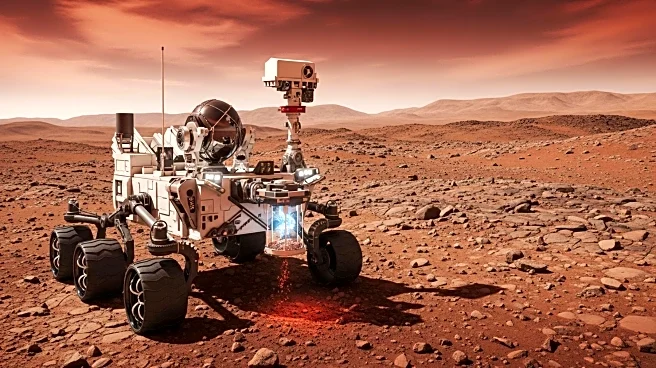What's Happening?
NASA's Curiosity rover has discovered the largest organic compounds ever detected on Mars, found in a rock sample from Gale Crater. These long-chain hydrocarbons, including decane, undecane, and dodecane, were identified in a sample known as Cumberland, drilled in 2013 at Yellowknife Bay. The compounds contain up to 12 carbon atoms, which is significant as most non-biological processes on Mars were expected to yield shorter chains. This discovery suggests that larger, biologically relevant precursors could exist on Mars, although they remain beyond Curiosity's detection limits. The finding was serendipitous, occurring while scientists were searching for amino acids. The hydrocarbons were released during heating inside Curiosity's Sample Analysis at Mars (SAM) instrument.
Why It's Important?
The detection of these large organic molecules is crucial as it demonstrates Mars' chemical complexity and the presence of persistent water, both essential for processes that could lead to life. While the molecules may not be biological in origin, their presence in an ancient lakebed suggests Mars had conditions similar to those that preceded life on Earth. This discovery tightens the focus on where and how to search for life on Mars. A Mars Sample Return mission is deemed essential to apply advanced tests that could confirm these compounds as biosignatures, potentially revolutionizing our understanding of life beyond Earth.
What's Next?
The next steps involve planning for a Mars Sample Return mission, which would allow scientists to conduct detailed analyses in Earth-based laboratories. These tests could determine the biological nature of the compounds found. Until then, Curiosity's findings will guide future missions in selecting promising sites for exploration. The scientific community is likely to continue discussions on the implications of these findings and the strategies for future Mars exploration.
Beyond the Headlines
This discovery highlights the importance of serendipity in scientific exploration, where unexpected findings can lead to significant breakthroughs. It also underscores the challenges of detecting delicate organics on Mars, as the heating process can transform them, requiring scientists to infer parent molecules from their thermal fragments. The ongoing research and exploration of Mars continue to push the boundaries of planetary science and our understanding of life's potential beyond Earth.









